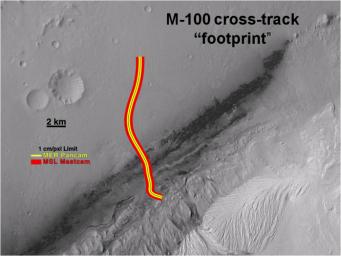
|
Studying a Wider Swath
- Click the image above for a larger view
- Full-Res JPEG (925 x 695) (93.7 kB)
- Full-Res TIFF (925 x 695) (1.9 MB)
Caption:
A section of the Mars Science Laboratory's Gale Crater landing site is shown, with a representative path from the landing location toward the layered mound to the south. The yellow line represents the area that could have been imaged along the path at the resolution of the Mars Exploration Rover Panorama Camera (Pancam). The red lines shows the distance to which the Mars Science Laboratory's 100-millimeter Mast Camera (Mastcam-100) can see the same resolution.
Using a criteria of resolution meaning three times the per-pixel scale, Pancam has a resolution of about 1.2 inches (3 centimeters) at a distance of about 38.25 yards (35 meters). Mastcam-100 has that resolution at about 147 yards (135 meters). Thus, the Mastcam can cover an area twice that (294 yards, or 270 meters) in the direction across the traverse path. This capability can be used to look for targets that might require the rover's path to divert.
Background Info:
Malin Space Science Systems, San Diego, built MastCam and two other cameras on Curiosity. NASA's Jet Propulsion Laboratory, a division of the California Institute of Technology in Pasadena, manages the Mars Science Laboratory Project for the NASA Science Mission Directorate, Washington.
Cataloging Keywords:
| Name | Value | Additional Values |
|---|---|---|
| Target | Mars | |
| System | ||
| Target Type | Planet | |
| Mission | Mars Science Laboratory (MSL) | Mars Exploration Rover (MER) |
| Instrument Host | Curiosity Rover | |
| Host Type | Rover | |
| Instrument | ||
| Detector | ||
| Extra Keywords | Color, Crater | |
| Acquisition Date | ||
| Release Date | 2011-11-28 | |
| Date in Caption | ||
| Image Credit | NASA/JPL-Caltech/MSSS | |
| Source | photojournal.jpl.nasa.gov/catalog/PIA15107 | |
| Identifier | PIA15107 | |
